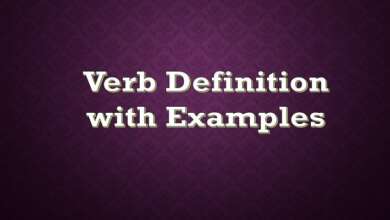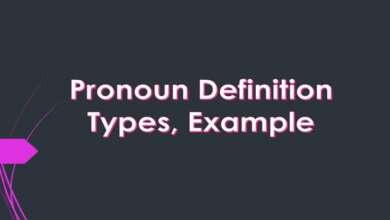Noun Definition In English, Meaning, Example, Types of Noun | PDF
What is Noun, Definition, Meaning, Examples, Types of Noun
What is Noun In English, Definition, Meaning, Examples, Types of Noun (Download PDF) – The word noun means right knowledge, right introduction. Therefore, the word which is well known to anything, person, animal, place, and emotion is called a noun.
The noun is also called ‘name’. The word ‘name’ consists of gender, word, and inflection. Hence ‘noun’ is also a name. Nouns include gender, verb, and inflections. The literal meaning of the noun is also ‘name’.
Definition of Noun
The words which give a sense of the name of an object, place, animal, feeling, action, etc. are called Nouns. Like-
India is a nation.
Ram reads the book.
Pankaj is a student.
Delhi is a city.
The Ganges originates from the Himalayas.
In the above sentence, Delhi, City, Pankaj, Vidyarthi, Ram, Book, Ganga, Vidyalaya, India, Nation, name are there is noun and Definition of Noun.
Types of Noun
There are five types of nouns in English.
(1) Proper noun
(2) Common noun
(3) Abstract noun
(4) Collective noun
(5) Material noun
Let’s understand that all these nouns are acquitted. What are all these and how are they used with examples –
(1) Proper Noun
The nouns words that identify with the name of a thing, person, animal, place, metal, group, or particular, are called proper nouns.
Such as – Delhi, Mumbai, Ramayana, Gita, Monday, Ram, Krishna, Kalidas, Gandhiji, India, Nepal, Ganga, Sunday, rice, gram, gold, silver, iron, Congress, Janata Dal, BJP, Army, Class VII, Class VIII, etc.
(2) Common Noun
Words that denote a whole species, that is, all things of the same type, beings, places, etc., are called Common nouns – such as boy, mason, river, mountain, country, city, metal, Cereal, Army, Party, etc.
Not – all are named in the appropriate examples. This is an introduction to a particular group. That group only goes to that particular group.
(3) Abstract Noun
The words that give knowledge of the name, quality, and condition of the sense are called abstract nouns, that is, the name of the sense is an abstract noun. Sense means lust, anger, greed, attachment, love, hatred, shame, enthusiasm, etc.
Sense means – a person, thing, place i.e. their sense situated in business, by whose existence the identity of that substance remains, e.g. melody in sweet, sour in sour, intelligence in wise, cunning in cleverness, gravity in master, god Divinity in man, humanity in man, hunger in the hungry is their sense. This is the sense of religion, which is a grammatical noun from the point of view of grammar.
(4) Collective Noun
The word which denotes a group of persons or animals, places, or things, that word is called Collective Noun. If we say it in simple words, then a whole community is called a collective noun. For example – people, class, bunch, assembly, herd, wheat heap, etc.
Example –
People, a group of many people.
Bunch, a large bunch or group of fruit.
Army, Our army is very brave.
All these people, bunch, and army are examples of collective nouns. Because these words make sense to their whole group.
(5) Material Noun
The word which denotes any substance, metal, or substance which we cannot count, only we can measure or measure or make sense of such noun is called Material noun.
For example, iron, water, milk, oil, gold, etc.
Example –
Strong tools are made from iron.
Cow’s milk is very tasty.
Jewelry is made from gold.
Milk, gold, and iron are examples of Material nouns in these sentences.
Difference between a proper and common noun
There are many names in a group and caste. Those names are called proper nouns. The boy is of one race, among them many persons have names. Ram, Mohan, Dinesh, etc. In the same way, the country is one race, but there are names like India, Nepal, etc. The mountain goes, name of the mountain is Himalaya, the Aravalli as a person. The city is a race, the name of the city is Delhi, Agra, Mumbai as a person. Grain is one species, the name of the grain is rice, and the gram as a person. The party is one caste, the name of the party in Congress, Janata Dal, BJP as a person. This is the difference between a proper and a common noun.
Special use of nouns
In the lines used, the three distinctions of nouns have been discussed in detail. But in a particular sense, proper nouns are used in caste and caste nouns are also used as proper nouns.
(1) Use of a common noun as a proper noun – Sometimes the word used for a particular caste or community is used as a person. In this case, that caste word is called a proper noun. like –
Panditji was the first Prime Minister.
Mahatma made the country independent by truth and non-violence.
Netaji said give me blood, I will give you freedom.
Maulana was our dear freedom fighter.
Mahatma, Pandit, Maulana, and Netaji, are being used in this sentence, despite being a caste noun, there is a proper noun here.
(2) Use of proper noun as a common noun – Sometimes the name of a person is not used for one person but is used for an entire caste on the basis of its merits and demerits. In such a situation, that person’s name becomes a caste noun rather than a proper noun. For example, Vibhishana, Harishchandra, Jayachandra, Sita, and Savitri, these names are proper nouns. But when these names are said for a group caste, they become a common noun. like –
Even today there is no dearth of Sita Savitri in the country.
Today’s Vibhishan is the traitor of the country.
Harishchandra is still there in our society.
Jaichand has always been born in this country
The names used in the above sentence represent a community or caste on the basis of qualities, and defects, hence they are caste nouns.
Download PDF – Click Here



